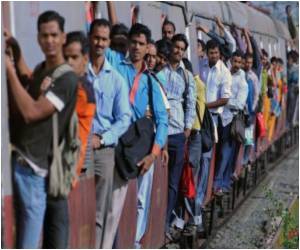Somewhere in the world -- Asia would be a good bet -- a pregnant woman is carrying a baby destined to be the planet's seven billionth human being.

Bookmakers have made Asia the hot favourite for the symbolic arrival, possibly for no better reason than that the sun rises in the east, giving Asian mothers a head start.
If they are right, another reasonable bet would be that the baby will grow up to be part of another historic demographic shift and live in a city.
By mid-2022 there will for the first time be more people living in Asia's urban areas than in the countryside as "a tidal wave of humanity" surges towards the cities in search of jobs and a better life, the Asian Development Bank (ADB) says.
The statistics are startling:
-- About 1.1 billion people will migrate from the countryside into Asia's cities in less than 20 years, according to the ADB. That's about 137,000 every day.
Advertisement
-- One hundred new cities from China will join the list of the top 600 urban centres -- which generate about 60 percent of global GDP -- in the next 15 years, says MGI.
Advertisement
But it is a demographic marker showing why the explosion in urban populations is so great: There are now twice as many people alive on earth as there were as recently as the 1960s.
And the six billionth child -- welcomed by former UN Secretary General Kofi Annan in Sarajevo, Bosnia on October 12 1999 -- is only 11 years old.
On the question of whether the millions heading for the cities are indeed likely to have the better life they seek, many experts are surprisingly upbeat despite the fact that humanity has never before faced such rapid urban growth.
The problems thrown up by this population explosion are huge -- from wretched slums, disease and crime to noxious pollution, overwhelmed infrastructure and crippling congestion.
But great cities have driven human development since the days of classical Athens and ancient Rome and are potent engines of social and economic development, the experts say.
"The most powerful places on the planet are cities, where knowledge and information is stored, where there is political administration, where ideas are disseminated from," Australian demographer and author Bernard Salt told AFP.
"It all comes from the frisson of having the best and the brightest coagulated together in a city environment."
Harvard professor Edward Glaeser sums up his opinion in the title of his book published this year: "Triumph of the City: How Our Greatest Invention Makes Us Richer, Smarter, Greener, Healthier, and Happier."
"In the world's poorer places, cities are expanding enormously because urban density provides the clearest path from poverty to prosperity," he writes.
But an upheaval of such magnitude will not be without its casualties.
"The transition from rural to urban does not automatically lead to middle-class prosperity, there are many that fall along the wayside," says Salt.
"This is exactly the same process that occurred in Britain during the Industrial Revolution from 1780 to 1840 -- there was tremendous human misery."
Already in Asia "cities and towns are places where poverty and disparities are most concentrated and visible", says the UN's Economic and Social Commission for Asia and the Pacific.
"Over 40 percent of Asia-Pacific?s urban residents live in slums, without access to adequate shelter and basic services, income opportunities and decision-making."
The ADB points out that visitors to many Asian cities are shocked by the uncollected garbage, the traffic congestion, the beggars and the squalid living conditions of vast squatter areas.
But "the leaps made by European and American cities will likely be repeated in the developing cities of the 21st Century," Glaeser predicts.
"The urban victories over crime and disease made it possible for cities to thrive as places of pleasure as well as productivity. Urban scale makes it possible to support the fixed costs of theatres, museums and restaurants."
While city-slickers in the West may weary of the conspicuous consumption and stress of city life and, ironically, seek a less materialistic lifestyle in the countryside or on the coast, that in itself is a luxury, says Salt.
"It is an element in Western society where people say all the material goods, worldly success, it doesn't mean anything. I'm not sure people in Guangzhou or Shanghai would be pontificating about the shallowness of consumption."
Clean, efficient cities in countries such as Canada, Switzerland and Australia regularly make the top ranks of the most liveable in the world -- but critics say that does not necessarily make them the most loveable.
"I think what makes a city a desirable, exciting place to be is where there is complexity where there is richness, where there is unexpectedness -- the opposite of the calm village life," says Professor Ricky Burdett, founder of the London School of Economics' Cities Programme.
"In Asia on the whole, in China, Hong Kong, Singapore and other wealthy or more balanced states, the growth and urbanisation has come with increased quality of life," Burdett told AFP.
"I am incredibly optimistic about cities, anywhere in the world," he said, with people in cities more likely to have access to education than those in the countryside.
"If you are educated, it is the first step to everything -- it is the first step to economic and social well-being and also health."
But the seven billionth person will have a lot of people hard on his or her heels competing for that education and that job in the city -- the world's eighth billionth person is due to arrive on June 15 2025.
Source-AFP










